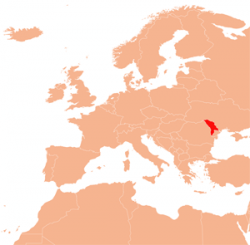 The following story comes from Moldova, a country whose citizens are often said to be more likely to be trafficked or traffickers than others in Europe. Given that stereotype, it is interesting that this news, while brief, is more nuanced than most coming out of richer countries.
The following story comes from Moldova, a country whose citizens are often said to be more likely to be trafficked or traffickers than others in Europe. Given that stereotype, it is interesting that this news, while brief, is more nuanced than most coming out of richer countries.
Human trafficking cases decline as illegal migration expands
Info-Prim Neo, 16.12.2008
The number of cases involving persons actually being trafficked tends to decline in favor of an increase in the number of illegal migration cases, according to the Board of the General Prosecutor’s Office of Moldova, Info-Prim Neo reports.
The Office said in a press release there have been recorded 510 trafficking-related offenses in 11 months of this year; of them, 209 were cases of trafficking of adults, 28 cases of trafficking of children, 152 cases of sexual exploitation, 106 cases of illegal migration, and 15 cases of child smuggling.
The prosecutors remark an alarming trend of trafficking cases where relatives and acquaintances have complicity. Cases where previously trafficked persons became traffickers represent another alarming trend. These cases are particularly difficult to investigate and examine in court.
According to the prosecutors, an element that facilitates human trafficking is corruption among persons in positions of authority. Trafficking and corruption are mutually reinforcing as they foster bribery and undermine the efforts made to counter these phenomena.
In the course of December the General Prosecutor’s Office is to finalize a series of acts that will make a priority to find criminal links between traffickers and persons in posts of authority.
The first good thing here is the absence of the abhorrent term sex trafficking : This authority is not making the fact of selling sex into a particular evil category. Next, the term illegal migration is used in the same breath as trafficking. Finally, they distinguish between child trafficking and child smuggling. I don’t believe it’s easy to make such distinctions, but I’d rather see them than the usual vast, reductionist statements.
Then these authorities mention, which everyone who studies migration knows very well, that relatives and friends are very often those who facilitate migrants’ journeys and jobs, whether those turn out happily or not. What outsiders decry as exploitation are often family strategies to get ahead. Are families often repressive instruments that punish girls more than boys? Yes. Should we lump all such family members into one messy bag called trafficking? It doesn’t help anyone. Migrants who’ve been selected as the most capable of being able to help the family as a whole do often suffer, but their greatest consolation can be knowing that they are helping their family. So dividing an exploited person from those she identifies with and loves is not kind. I would like to see things change, but not by imposing an idea about gender equality that does not take into account local realities.
The main point the Moldovan authority wants to make is the link between trafficking and corruption. Corruption is another word that can be misused and end up covering way too much, including ordinary local customs. But again, migration scholars know that getting the right papers to allow travel and work depends in many cases on the complicity of officials of all sorts: consider the cases of using false papers described here. And for those interested in some historical perspective, consider what refugees from Germany say about being smuggled in the 1940s, in a book by Dorothy B. Hughes.
